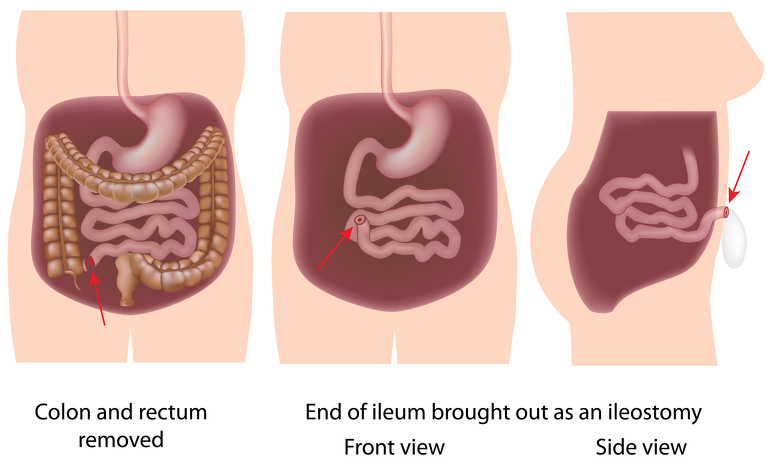
Pan-proctocolectomy with ileostomy surgery removes the entire colon, rectum and anus and forms a stoma using the end of the small intestine, known as the ileum to remove waste from your body. It is also known as a total proctocolectomy.
It is used to treat ulcerative colitis and Crohn’s disease which affects the colon - Crohn’s (granulomatous) colitis and ileocolitis.
If your inflammatory bowel disease (IBD) is not responding to other treatments and you have severe inflammation or damage to all, or part, of your large intestine (colon) and rectum then you may have a pan-proctocolectomy.
You may also have this surgery if your bowel perforates or you have bowel cancer or a very high chance of developing it.
The day before your surgery you will likely be asked to take a bowel preparation which will give you diarrhoea to clear the bowel of any faeces to make the operation easier. You may also need to follow a specific diet and avoid some medications.
Shortly before your surgery your blood pressure and breathing will be monitored and you will be prepared for theatre. You may be given medicine through a vein in your arm. Just before the surgery you will be given a general anaesthetic which will put you in a sleep-like state so that you won’t be aware of what’s happening.
Total proctocolectomy surgery can be carried out either through open surgery or laparoscopic (keyhole) surgery. The type of surgery you receive will depend on your circumstances and the surgeon you have. It should be discussed with you prior to your operation.
Open surgery: An incision will be made along your abdomen to provide access to the colon for your surgeon. They will then identify the damaged section of the colon and remove it.
Laparoscopic surgery: Several small incisions (or ports) are made in the abdomen. A small camera is inserted through one of the ports to direct the surgeon to the colon. Surgical instruments are inserted through the other incisions and the colon is freed and then pulled through one of the ports. This type of surgery is meant to result in a quicker recovery time for the patient and also less scarring. In some cases the surgeon will discover during surgery that they need to convert to open surgery due to unforeseen circumstances.
Once the surgeon has removed the colon, rectum and anus the ileostomy must be formed. To do this a small incision is made in your abdomen (usually on the lower right side) and the ileum is pulled through. It is then sewn to the skin. As this heals the ileum fuses to the skin. This is known as a stoma. You will then pass waste through your stoma into a bag which is fixed to it.
Once the procedure has been completed the surgeon will close the incision/s in your abdomen. How this is done depends on whether you received open or laparoscopic surgery. The wound in open surgery is often large and runs down the middle of the abdomen. In general this will be closed using clips which will then need to be removed around 10 days after surgery. The wounds in laparoscopic surgery are much smaller and often a special type of glue is used to fix them back together. This glue dries and falls off naturally. In both cases stitches may also be used - these can be dissolvable or may need removing around 10 days after surgery.
After your surgery you may need to stay in hospital for around a week until you regain normal bowel function. The length of your stay will also depend on whether you had open or laparoscopic surgery.
You may receive nutrition through an intravenous drip until your bowel has healed a little and you are able to drink more normally. At first you will probably just be able to drink clear fluids, slowly moving to thicker fluids and then soft foods as your bowels start to work again (around 2 days after your surgery).
You will see an ostomy nurse who will teach you how to care for you ileostomy and it is likely they will visit you at home once you leave hospital.
It will probably take several weeks after leaving hospital for you to begin to feel better. You will probably be advised against any heavy lifting or strenuous physical activity and you may not be able to drive for a couple of weeks.
You may be recommended to follow a certain diet, or avoid certain foods, in the weeks immediately after surgery to aid healing. There are also some foods that are recommended for people with stomas to avoid completely. The ostomy nurse will discuss this with you.
There are risks associated with any abdominal operation and you should discuss the risks specific to you with your surgeon before the operation